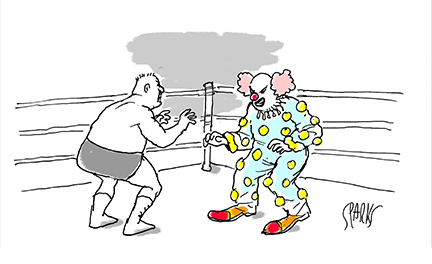
This month we were joined by New Yorker cartoonist Rich Sparks, whose band, The Last Afternoons, just released their latest album, “Deadfall.” You should buy it, along with Sparks’s cartoon collection, “Love and Other Weird Things,” which Roz Chast blurbed even though she says she is “trying to get out of the blurb game.”
Sparks’s cartoon is set in a wrestling ring, where an evil clown is facing off against his more traditionally-attired opponent. The clown is speaking.
Sparks’s original caption—“I’m the one who made Emmett Kelly so sad.”—is a reference to the actor who created the sad clown character “Weary Willie.”
Like Sparks, several of you had the clown trying to intimidate his opponent with trash talk, most of which involved balloon animals:
- “I’m going to twist you into the shape of a poodle.”
- “I twisted my last opponent into a poodle.”
- “Ready to see how balloon animals are made?”
- “I’m gonna twist you into a balloon animal.”
- “I’m gonna twist you like a balloon animal.”
Those entries are all very similar—the last two are identical except for one word—but the last caption is, in my opinion, the best because it’s a direct threat and the word “like” is punchier and therefore superior to the word “into.”
This month’s best sex joke is another reference to balloon animals: “I don’t care if it’s technically a balloon. She’s still my wife.” I took a lot of heat for including that entry among my top ten, and Bob Mankoff questioned whether it even made sense. I think it does. The idea is that the clown’s opponent slept with a sex doll, which is technically a balloon because one must inflate it. The clown, who is practiced in the art of making things out of balloons, created and then married the sex doll that the wrestler slept with.
I hope you find that explanation satisfying. Bob did not. He suggested that “I don’t care…” is just the latest in a series of sex jokes I champion every month, and that the drawings we feature in our contests are now like Rorschach tests that provide unwanted insight into my perverse obsessions.
Some other trash talk captions allude to the fact that evil clowns are often the stuff of bad dreams:
- “I’m the nightmare you won’t be able to interpret.”
- “I’m your worst nightmare.”
Here are two more references to the fear of clowns, a phenomenon known as coulrophobia:
- “Kudos to Dr. Fishbein—he knows how to treat a phobia.”
- “I was told you have a phobia.”
I love the way that last entry suggests that the clown is using information about his opponent’s debilitating fear of clowns to his advantage in the ring.
Bob liked this entry—“I’m starting to believe this isn’t Jimmy’s birthday.”—but it doesn’t match the clown’s sinister expression. It would work better if the clown looked apprehensive.
This caption explains why the clown appears so confident: “I ain’t afraid of you. I used to do kids’ birthday parties.”
This next entry transforms an ordinary statement into a fitting caption by playing on the double-meaning of the second-to-last word: “Finally, some serious competition.”
This entry replaces the last word in a common expression with a word that ties everything in the drawing together: “This is gonna tickle.”
And this entry takes a common expression and twists it just a little to make it work: “It’s funny until someone gets hurt.”
Finally, we have a reference to a comedic prop that clowns often use: “I’m not just made. I’m honking mad.”
Congratulations to frequent contest finalist and winner PAUL NESJA, who co-hosts The New Yorker Cartoon Caption Contest Podcast. He won this contest with, “I’m gonna twist you like a balloon animal.”
The five runners-up were:
- “I ain’t afraid of you. I used to do kids’ birthday parties.”
- “It’s funny until someone gets hurt.”
- “Finally, some serious competition.”
- “I was told you have a phobia.”
- “This is gonna tickle.”
If you want to see how we made our selections, we recorded the process and posted it on our Youtube Channel.
ANOTHER SHAMELESS PROMOTION: My book on The New Yorker Cartoon Caption Contest—“Your Caption Has Been Selected”—hits the shelves on June 4. Please buy many copies. There should be plenty, as the initial print run is 19,000. The book has received positive notices from Kirkus Reviews and Publisher’s Weekly, and it will soon be featured in The Atlantic and on the podcast “The Gist” with Mike Pesca. It will also be excerpted on LitHub, and reviewed in The Christian Science Monitor.

